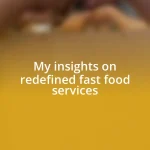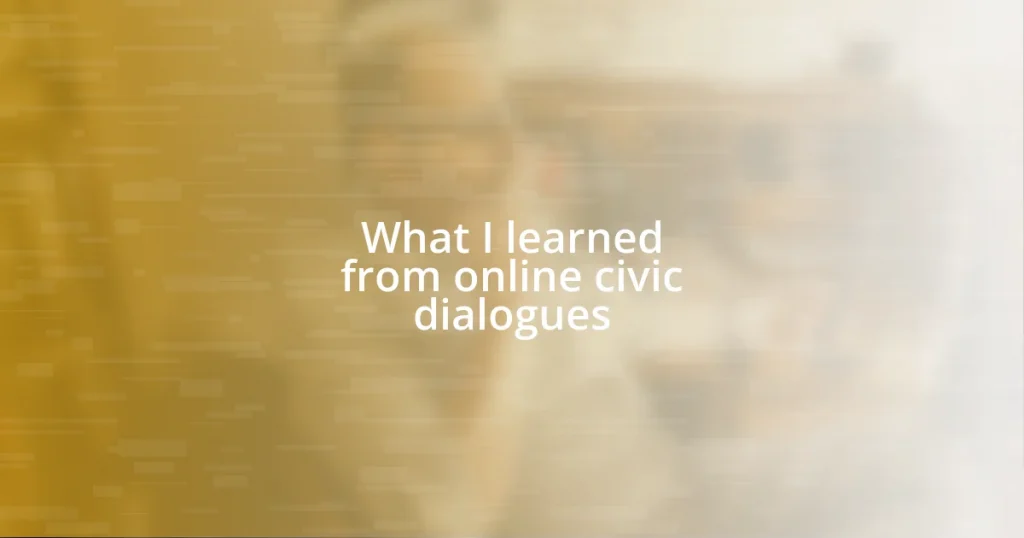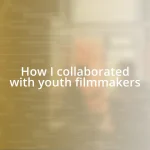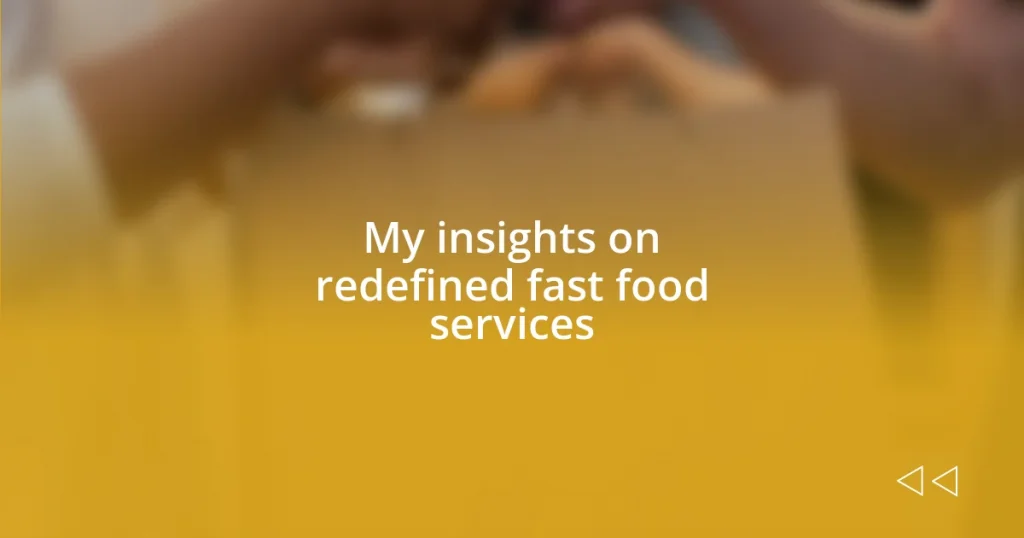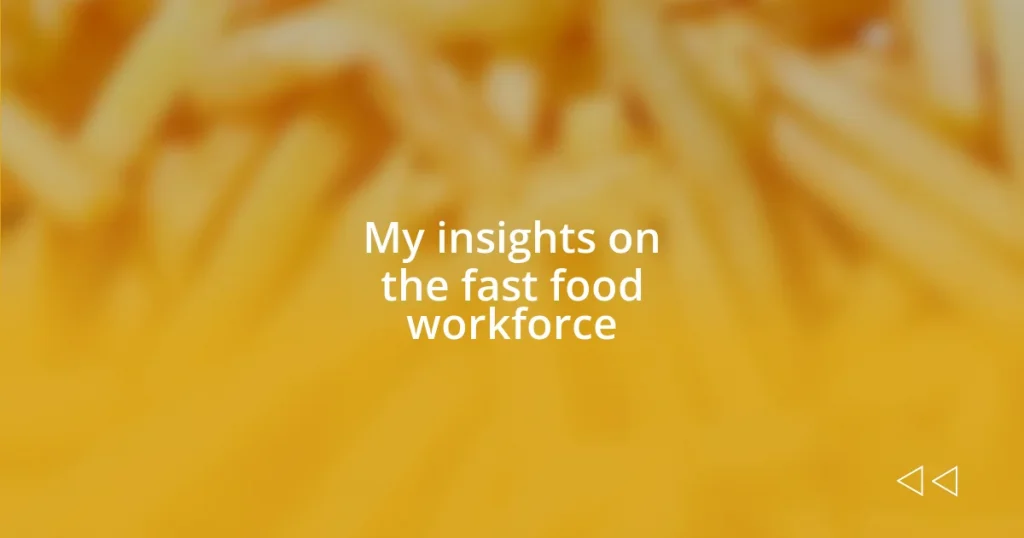Key takeaways:
- Active listening and empathy are crucial in fostering understanding and connection during online civic dialogues.
- Engaging storytelling can transform conversations by humanizing issues and encouraging deeper emotional exchanges.
- The impact of dialogues extends beyond discussions, motivating participants to take collective action and create positive change in their communities.

Understanding online civic dialogues
Online civic dialogues serve as virtual town halls, where individuals can come together to discuss community issues and concerns in a space that feels accessible to all. I remember my first experience participating in one; it was thrilling to see so many different viewpoints converge. How often do we get the chance to hear from those who see the world through fundamentally different lenses?
In these dialogues, the power of active listening becomes evident. When I engaged with others online, I found that many participants genuinely wanted to understand each other’s perspectives—something that sometimes feels lost in face-to-face conversations. Isn’t it fascinating how a shared digital space can break down barriers, allowing for more vulnerability and openness?
Moreover, the asynchronous nature of online dialogues enables deeper reflection. I often hit pause on my emotional responses, taking time to process before replying, which has led me to articulate my thoughts more clearly than I might have in a heated discussion. Have you ever felt that a little distance helps you understand an argument better? It’s enlightening to realize that these platforms can foster not only discussion but also personal growth and understanding.

Engaging in community discussions
Engaging in community discussions online fosters a sense of belonging that can be hard to find elsewhere. I vividly recall a moment during a dialogue when someone shared their experiences with local policing, sparking a profound empathy in me. Hearing their story shifted my perspective entirely, and I realized how powerful it is to humanize abstract issues through personal narratives.
Direct engagement in these discussions allows for a dynamic exchange of ideas. During one particularly lively session, I asked a question that led to a complete shift in the conversation’s direction. I could feel the collective energy change as others chimed in with their thoughts. Reflecting afterward, I recognized that the act of questioning is not just about seeking answers; it’s a catalyst for deeper understanding.
I’ve also learned that civility plays a crucial role in sustaining these dialogues. In one conversation, I saw how quickly things can spiral out of control when tempers flare. However, when participants remain respectful, the discussions can evolve into collaborative problem-solving. It’s a reminder of how the tone we set can significantly impact the outcomes of our conversations.
| Key Aspect | Personal Experience |
|---|---|
| Empathy and Understanding | Listening to a participant’s story about their struggles opened my eyes to issues I had previously overlooked. |
| Dynamic Exchanges | My question once redirected an entire conversation, illustrating the power of inquiry in online discussions. |
| Civility | Witnessing the downfall of a heated discussion reminded me that respect fosters constructive dialogue. |

Benefits of participating online
Online civic dialogues offer a plethora of benefits that can truly enhance our understanding of community issues. One benefit I’ve experienced firsthand is the accessibility these platforms provide. I remember a particular session where I could engage despite my busy schedule, fitting it into my day without the need to travel. This flexibility not only encouraged me to participate more but also allowed voices from varied backgrounds to join in, enriching the conversation.
Moreover, the opportunity for anonymity sometimes allows participants to express their opinions more freely. I’ve observed that when people feel less constrained by social awkwardness or fear of judgment, they tend to share insights that might otherwise stay hidden. This dynamic can lead to groundbreaking perspectives that challenge the status quo. Here are some benefits that stood out to me:
- Wider Range of Perspectives: Engaging with individuals who hold diverse views helps broaden my understanding of complex issues.
- Flexible Participation: The convenience of joining discussions from anywhere means I’m more likely to engage when I can.
- Courage to Speak Up: Anonymity can empower individuals to voice their opinions, leading to richer dialogues.
- Increased Engagement: The interactive nature keeps the conversation lively, allowing spontaneous exchanges that reveal much deeper insights.
In online dialogues, I’ve also found that written responses can enhance the depth of exchanges. Once, I took my time crafting a thoughtful reply to a particularly emotional topic about community loss. This pause allowed me to reflect deeply and share not just my thoughts, but my emotional response to the shared grief. When I posted it, the appreciation I received reaffirmed the importance of context and clarity in communication—something that often gets lost in quicker, spoken word exchanges. Such moments highlight how online dialogue can not only initiate conversations but also cultivate a supportive community that thrives on shared experiences and vulnerabilities.

Techniques for effective dialogue
One powerful technique I find essential in effective dialogue is active listening. I remember a particular session where I truly focused on what others were saying, not just waiting for my turn to speak. It felt transformative; it was like a bridge forming between our thoughts. When I fully absorbed the perspectives shared, it allowed me to respond in a way that resonated with participants, creating a deeper connection.
Another technique is encouraging narrative sharing. Have you ever noticed how a simple story can shift the atmosphere of a conversation? I witnessed this firsthand when a participant shared their personal journey regarding community challenges. The room was filled with tension, but once that story was told, empathy surged through the group. It reminded me that personal anecdotes can dismantle barriers and foster a genuine exchange of feelings, sparking a collective desire to understand and solve problems together.
Maintaining a positive tone is also crucial during these dialogues. One time, I stepped into a discussion that started on shaky grounds, with participants quickly trading barbs. It struck me how a single positive remark ignited a change. By simply complimenting an insightful comment, I saw the hostility fade. This experience taught me that the energy and language we bring to a dialogue can transform contentious moments into opportunities for collaboration. Isn’t it fascinating how a few kind words can redirect a conversation’s trajectory?

Overcoming challenges in conversations
One major challenge I’ve encountered in online conversations is the misinterpretation of tone. I remember a discussion that quickly escalated when someone took my straightforward comment as sarcasm. This misunderstanding created unnecessary tension, and I realized that without visual cues, our words often lose their intended warmth. I learned to be intentional with my phrasing, always aiming to clarify my tone, which has made my contributions clearer and more respectful.
Building rapport is another hurdle I’ve faced. Often, conversations begin with a sense of formality, leading to a slow-paced exchange. I distinctly recall a dialogue where breaking the ice with a lighthearted joke about our virtual backgrounds transformed the atmosphere instantly. It created a shared moment of laughter that made participants more willing to engage openly. This experience taught me the power of humor and warmth in fostering connections, even through screens. Have you ever noticed how a simple, relatable comment can shift the dynamics of a group?
Receiving negative feedback is also daunting. I vividly remember sharing an opinion that triggered an unexpected barrage of criticism. Initially, I felt defensive, but over time, I learned to view such feedback as an opportunity for growth. Embracing a mindset that views constructive criticism as valuable rather than personal has allowed me to refine my thoughts and contribute more effectively. This shift helped me appreciate that each conversation can enhance my understanding and strengthen my contributions in future dialogues.

Evaluating the impact of dialogues
One way I’ve evaluated the impact of online civic dialogues is through the sense of connection forged among participants. I recall a session that, at first glance, felt disjointed. However, as the conversation unfolded and individuals began to share their unique perspectives, the palpable shift in energy was undeniable. It became clear that, even through screens, we were building a communal bond. I often wondered: how can shared experiences alter our perceptions of one another? This realization affirmed my belief that these dialogues can transcend mere discussion and evolve into a powerful catalyst for unity.
Another aspect I consider is the lasting change in attitudes and behaviors. I personally experienced a profound shift during a civic dialogue focusing on environmental sustainability. Initially, participants held strong opposing views, but after exchanging stories and data, I noticed a remarkable transformation. People who were once firm in their stances began to express understanding and willingness to compromise. Why does this happen? I believe it’s the emotional connection paired with shared information that breaks down walls, allowing us to reconsider long-held beliefs.
Lastly, I’ve found that evaluating the effectiveness of these dialogues often lies in the follow-up actions of participants. After a particularly intense session addressing social justice, I felt inspired to organize a community clean-up event. What surprised me was how many others were motivated to join in. Isn’t it moving to see how a single conversation can spark proactive change? It becomes clear that the dialogue’s impact extends beyond words; it can ignite collective action that benefits the community, reinforcing the idea that meaningful conversations truly matter.

Applying lessons to real life
The lessons from online civic dialogues have truly shaped my day-to-day interactions. For instance, I’ve taken the practice of active listening beyond my screen. I remember attending a community meeting where I made a conscious effort to really hear what others were saying before responding. This approach transformed my interactions, reducing misunderstandings and fostering a supportive environment. Have you ever noticed how simply validating someone’s point can open up new avenues for discussion?
Additionally, I’ve started applying this commitment to clarity in my everyday conversations. I think back to a casual coffee catch-up where I actively chose my words more carefully. By being thoughtful about my phrasing, I noticed my friend opened up more, sharing insights and thoughts I hadn’t heard before. It made me realize the impact of intentional communication—how it can turn a normal chat into a deeper dialogue. Have you experienced that shift when someone truly tries to understand you?
Moreover, the empowerment I felt after voicing my opinions in those dialogues has spilled into my personal life. There was a time when I hesitated to speak up during team discussions at work. After witnessing how acknowledging diverse perspectives led to constructive outcomes in civic sessions, I decided to bring that same openness into the workplace. Surprisingly, my colleagues welcomed my contributions, which reinforced the idea that everyone’s voice matters. How powerful is it when we realize that our experiences and insights can positively impact others?

